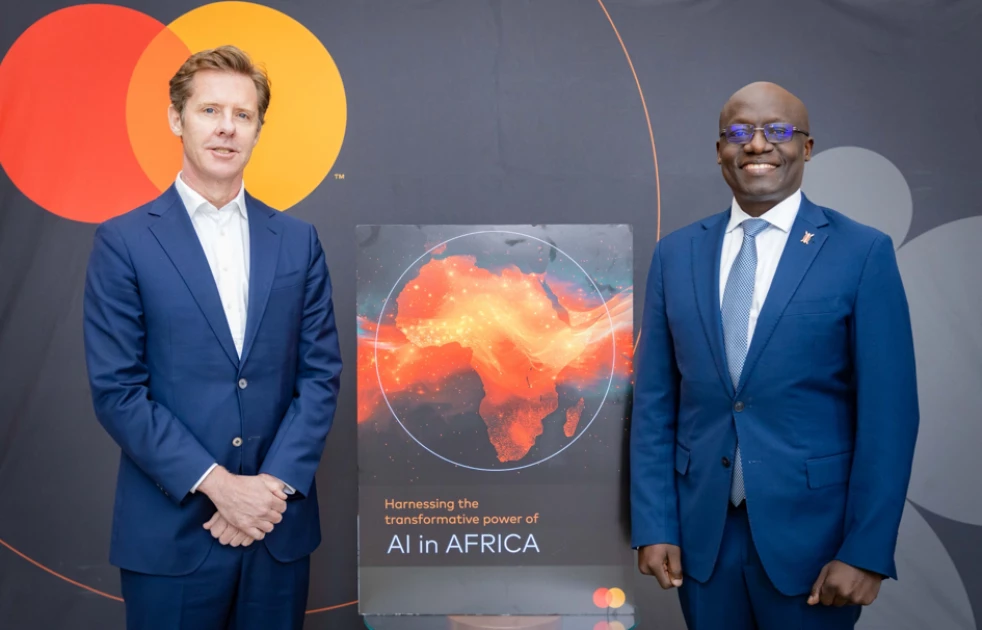Africa’s Ksh.582 billion AI market to hit Ksh.2 trillion by 2030 – Report

Mark Elliott, Division President, Africa at Mastercard (L) and Ambassador Philip Thigo, Special Envoy on Technology in Kenya (R), at the official launch of the Mastercard whitepaper on August 6, 2025. PHOTO | COURTESY

Audio By Carbonatix
Africa’s Artificial Intelligence (AI) market is projected to grow from USD 4.5 billion (approx.
Ksh.582 billion) in 2025 to USD 16.5 billion (approx. Ksh.2 trillion) by 2030,
according to a new whitepaper released on Wednesday by Mastercard.
The
report, titled ‘Harnessing the Transformative Power of AI in Africa,’ paints a
compelling picture of the continent’s readiness to leverage AI for inclusive
economic transformation - if responsibly and strategically deployed.
The
whitepaper offers a panoramic view of the AI landscape across the continent,
spotlighting opportunities in key sectors such as agriculture, healthcare,
education, energy, and financial services.
It
underscores the urgency of investing in data infrastructure, talent
development, regulatory frameworks, and ethical governance to fully unlock AI’s
potential.
“Africa’s
engagement with AI is already reshaping lives — not just in labs, but in farms,
clinics and classrooms,” said Mark Elliott, Mastercard’s Division President for
Africa.
“To unlock its full potential, we need investment in infrastructure, data, talent, and policy.”
The
whitepaper projects the creation of up to 230 million digital jobs by 2030,
facilitated in part by AI-powered tools and platforms.
In
finance, AI is already revolutionizing credit scoring and fraud detection,
opening formal financial services to previously excluded populations.
Mastercard’s Chief AI and Data Officer, Greg Ulrich, emphasized the importance of trust in AI deployment, noting: “AI is only as powerful as the trust behind it. This isn’t just innovation—it’s innovation with integrity.”
South
Africa stands out with USD 610 million (approx. Ksh.79 billion) in AI venture
capital secured in 2023, expected to grow to USD 3.7 billion (approx. Ksh.479
billion) by 2030.
The country boasts the highest data and infrastructure readiness on the continent, supported by institutions like the Artificial Intelligence Institute of South Africa. By 2030, national targets include developing 300 AI startups and training 5,000 AI professionals.
Dubbed
Silicon Savannah, Kenya is gaining ground as an AI innovation leader. Local
startups are harnessing mobile-first infrastructure to roll out impactful
tools—such as Tala, which uses mobile data for credit scoring, and UlizaLlama,
a chatbot by Jacaranda Health that offers maternal health support in five local
languages.
The recent unveiling of the National AI Strategy (2025–2030) positions Kenya to lead in regional AI research, commercialization, and public-sector deployment.
Nigeria,
home to the second-highest number of AI startups in Africa, attracted USD 218
million (approx. Ksh.28 billion) in venture capital last year.
With
a projected AI market size of USD 1.4 billion (approx. Ksh.181 billion) by 2025,
the country is deploying AI in personalized education (via Rising Academies),
microfinance (Kudi.ai), and even public governance.
A synergy of government foresight and private innovation places Nigeria in a strong position for accelerated AI adoption.
In
North Africa, Morocco is advancing AI across diverse sectors, led by Mohammed
VI Polytechnic University and firms like DeepEcho.
The MoroccoAI Annual Conference is shaping the national AI discourse, while the government’s Digital 2030 Strategy aims to attract USD 1.1 billion (approx. Ksh.142 billion) in investment and create 240,000 digital jobs. Still, challenges such as data fragmentation and regulatory inconsistencies could hinder progress.
The
Mastercard whitepaper calls for multi-stakeholder collaboration—between governments,
global tech firms, financial institutions, and local innovators—to responsibly
scale AI solutions and avoid deepening the digital divide.
By
highlighting homegrown innovations and interviewing experts from organizations
like UNESCO, the African Center for Economic Transformation, and regional
fintech leaders, Mastercard paints AI not just as a technological tool, but as
a “development imperative.”
“Africa
has the demographics, the digital drive, and the entrepreneurial DNA,” the
report notes, “but translating this into equitable progress will require
deliberate policy, ethical deployment, and inclusive design.”



Leave a Comment